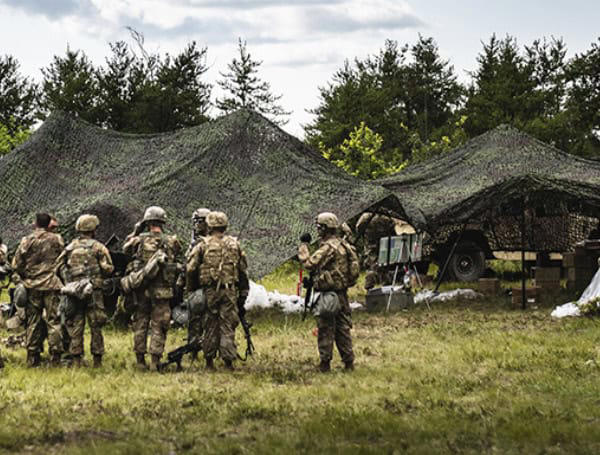Five Chinese nationals have been charged with conspiracy, lying to federal investigators, and destroying evidence after a suspicious visit to a Michigan Army National Guard base during a midnight military exercise in August 2023. The federal indictment, announced on Wednesday, shines a light on the defendants’ secretive activities near Camp Grayling and raises serious questions about potential espionage.
The individuals involved — Renxiang Guan, 23; Zhekhai Xu, 22; Haoming Zhu, 21; Jingzhe Tao, 22; and Yi Liang, 23 — were all students at the University of Michigan at the time. The group was caught near a large-scale National Guard training exercise known as “Northern Strike,” which involved live-fire drills, military vehicles, and highly sensitive communications equipment. Adding to the gravity of the situation, personnel from Taiwan were reportedly participating in the exercises, suggesting heightened security and geopolitical sensitivity.
While the charges against the students do not directly relate to espionage, they are linked to their subsequent actions — particularly their attempts to deceive federal investigators and their destruction of records related to their visit. The case has triggered concerns about foreign surveillance on U.S. soil, especially given previous instances of Chinese nationals being apprehended near sensitive military installations.
On a rainy night in August 2023, the five students were spotted on the outskirts of the restricted Northern Strike exercise area at Camp Grayling. Despite clear warning signs and caution tape, the group bypassed these barriers and ventured dangerously close to the training zone, which was under tight military security. When confronted by a National Guard officer, the group falsely claimed to be members of the media covering the event. After this brief interaction, they quickly fled the scene, raising immediate suspicions.
Local law enforcement soon tracked the group to a nearby motel in Grayling, Michigan, where they had booked rooms. Their proximity to the military exercises, along with their hasty retreat, raised red flags. However, it wasn’t until months later, when one of the students, Renxiang Guan, attempted to fly to Shanghai from Detroit Metropolitan Airport, that the case took a more serious turn.
Upon his detention, Guan changed his story, telling authorities that the group was in the area for “stargazing.” However, when investigators searched his electronics, they found two photos of military vehicles taken during their visit to Camp Grayling — a direct contradiction to his earlier claim. This discovery led to further questioning of the other four students, who had flown to Chicago O’Hare International Airport from Iceland three months after the incident.
The investigation quickly unraveled a web of inconsistent statements and coordinated efforts by the group to cover their tracks. During their interviews with FBI agents, the students gave contradictory explanations for their presence near the military base. They claimed they had come to the area to observe a meteor shower, despite it being a rainy and overcast night — an implausible story that did little to allay the FBI’s suspicions.
Moreover, their statements about when they had booked their motel rooms also conflicted, further undermining their credibility. Investigators discovered that the group had communicated via the messaging app WeChat, where they discussed the encounter with the National Guard officer and strategized how to align their stories in case they were questioned.
More damning was the FBI’s discovery of messages in which the defendants admitted to deleting incriminating photos from their phones and cameras. The group had also gone to great lengths to conceal their electronics, using third parties to carry their devices on a trip to Iceland in an attempt to avoid searches. These actions, outlined in the criminal complaint, suggest a deliberate effort to evade law enforcement and obscure the true nature of their activities.
The case has drawn parallels to other instances where Chinese nationals have been caught engaging in suspicious activities near U.S. military facilities. The indictment referred to an earlier case involving two University of Michigan students who were arrested for taking unauthorized photos at Naval Air Station Key West in Florida in 2020. Those individuals were later sentenced to prison time.
The five students charged in this case had been attending the University of Michigan as part of a joint two-year program with Shanghai Jiao Tong University. Their program concluded in May 2024, and all five have since left the United States. While none of them are currently in custody, federal prosecutors have made it clear that they will be arrested and face charges if they re-enter the country.
Gina Balaya, a spokeswoman for the U.S. Attorney’s Office in Detroit, confirmed the gravity of the charges, stating, “Should they come into contact with U.S. authorities, they will be arrested and face these charges.”
The incident at Camp Grayling raises broader concerns about the potential for foreign surveillance on U.S. soil. While there is no direct evidence linking the five Chinese nationals to espionage, their behavior, coupled with the destruction of evidence and false statements, suggests a deliberate attempt to gather intelligence or observe sensitive military activities. Given the geopolitical tensions between the U.S. and China, particularly over Taiwan, such incidents are likely to be scrutinized more closely in the future.
As this case unfolds, it remains a stark reminder of the vulnerabilities that exist within U.S. borders, especially when it comes to safeguarding military installations from potential foreign surveillance. Whether or not this case will lead to further action remains to be seen, but the charges filed on Wednesday signal a firm stance by federal authorities against any perceived threats to national security.


Since these Chinese have been caught as spies they should face the the aspect of being executed for their spying and the Biden admin. should also be charged with treason and/or sedition and face the same charges as these Chinese spies for allowing them to infiltrate our country and for trying to buy up OUR FARM LANDS which should be a no no for every AMERICAN to take notice that this Biden Cabal is what is causeing this country so much disaster politically and physically to those affected by this administration!!